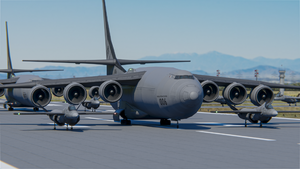C512 Belugaléo
|
C512
Takáura-Proole C512 Belugaléo
|
|||||
|---|---|---|---|---|---|
| Airlifter | |||||
| Role | Heavy Transport Airlifter | ||||
| National Origin | Algiza, Tekkia | ||||
| Production History | |||||
| Produced | |||||
| 2149 - 2155 | |||||
| Designer | Takáura, Proole | ||||
| Unit Cost | 31,8785(√) | ||||
| Number Built | 7 (including 2 prototypes) | ||||
| Service History | |||||
| In Service | |||||
| 2147 - Ongoing | |||||
| Used By | Takáura New Grestin Air Force Arvenian Air Force Sarconian Air Force | ||||
| Aircraft Characteristics | |||||
| Dry Mass | 165,535 kg | ||||
| Length | 61.7 m | ||||
| Width | 49.4 m | ||||
| Height | 17.1 m | ||||
| Propulsion | 6 x Corain Motors PN-09-10 High Bypass Turbofan Engines 6 x [pelican engines] |
||||
| Maximum Velocity | 220m/s | ||||
| Operational Range | 400km km | ||||
| Crew | Two Pilots 128-240 passenger capacity |
||||
| Variants | C512-100 (A512-001, 006, 007) C512-200 (A512-002, A512-003, (A512-004, A512-005) |
||||
The Takáura-Proole C512 Belugaléo or EL-512 Belugaléo is a strategic heavy lift cargo aircraft designed and produced by Takáura and Proole in Algiza and Tekkia.
Development
Work on the aircraft was split roughly evenly between the two companies. The cockpit, main wings and front fuselage sections were designed and manufactured by Takáura, while Proole developed the empennage, cargo door mechanism, rear fuselage and main gears. The second prototype and first three production models were powered by 6 [pelican engines]. The other three aircraft in the Belugaléo fleet were powered by 6 Sarconian PN-09-10 high-bypass turbofan engines of the same type used on the CP128 Orcalean. The wings of the C512 were far too large to be flown to Tekkia, and instead had to be transported by sea and rail to Proole's final assembly plant in Ambargo.
Design
Variants and Differences
As both prototypes were essentially custom built and no serial production run was originally envisioned, the first two aircraft differed significantly to suit the needs of their operators. A512-001, the initial production example owned and operated by Takáura, was 56.7 metres long. A512-002, the second 'prototype' and anticipated final airframe, was stretched by 8 fuselage segments or 5 metres, enlarging its cargo volume to 470m3. Two extra horizontal stabilisers were added to compensate for the increased instability. Takáura's aircraft was powered by 6 Sarconian PN-09-10 high-bypass turbofans of the same type used on the CP128 Orcalean, while the second airframe used [Pelican engines].
History
After an appearance at KITE 2152, where A512-002 was used to transport Grestian equipment and exhibits to the show and then displayed half inside Takáura's booth and half inside Proole's, interest in the Belugaléo vastly exceeded both company's expectations. Three were ordered by Arvene, and a further two were purchased by the United Doren Front the following year.
Partly due to the unexpected demand to continue the program, the Arvenian aircraft, A512-003 through to 005, were produced to almost the exact same specifications as A512-002. For the final two planes, the UDF requested they be built to the original shorter length and use Dorvic Corain Motors engines.
Little information is known of the Arvenian Belugaleo fleet after its delivery. They were rarely sighted in flight. It was reported in 2163 that one of the planes had been cannibalised for parts to keep the other two in airworthy condition, after Seifare cut off all trade to the country following repeated thefts of its intellectual property.

The UDF's aircraft were used as a strategic airlifters, as well as contracted out under Phantom Systems to transport aircraft components from Hermia to Aerfel. Following the dissolution of the United Doren Front, A512-006 'the Glutton of Esperi' and A512-007 'Ud Netuar' (Sarconian: lit.'Endurance') were inherited by Sarconia. Both were mothballed for over a decade, but eventually fully restored in Algiza in 2174 and 2176. During the second phase of their lives, they ceased civilian contract work, with few exceptions. 006 was attached to Zeuldopine-114, while the latter operated from Fort Aitken.